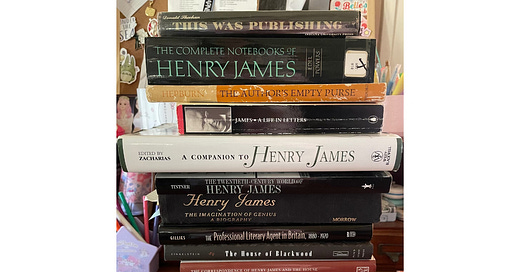Not Just Another Book Stack
A small representation of the nearly 200 books and articles that made up my dissertation research
These are just a few of the materials I used during my PhD dissertation research. I did use quite a few articles I obtained through databases or interlibrary loan - all printed out, of course. I couldn’t have managed the notes and highlighting in an electronic format.
My primary sources, however, were the archives and letters of the involved parties, namely, James Brand Pinker, Henry James, and the publishers Pinker interacted with on James’ behalf, including Scribner’s, Harper & Brothers, Heinemann, Methuen, Houghton Mifflin, Chapman & Hall, and Constable, as well as various periodicals.
I used 50 secondary sources and consulted 127 other works to connect the dots between Pinker’s efforts and James’ publications. In spite of working full-time and raising two children on my own, this was a gloriously satisfying project. Yes, I wrote in the middle of the night and on my lunch hour, and read incessantly in-between housework and helping children with homework.
How did I make this happen? I loved it. End of story. Those who told me to just quit and stop making my life so difficult had no idea how crazy I was about the story I was piecing together, a story no one else had delved into in such detail. Not even close. I knew that Pinker hadn’t been given enough attention or credit for his work, not only on behalf of James, but on the other authors he worked for (often with great struggles due to their behaviors and attitudes).
How do you explain this love to those who just don’t get it? When I told people who asked about it that my dissertation concerned Henry James, their eyes glazed over and they said things like “oh, that Turn of the Screw guy” or “ugh, I had to read Daisy Miller in high school, what a downer.” But when I explained what it really was about, the business end of publishing from 1898-1916 and the work of a literary agent to keep an aging author who was losing popularity in print, most of them took a moment to think, and then began to ask questions. This was a different animal than a new perspective on a James work; in fact, it had nothing to do with any literary interpretations at all.
An editor who turned down a portion of my dissertation as an article in an academic journal complained that there was nothing about any of James’s novels, no discussion of content, which he was expecting. He missed the entire point of the piece, and I didn’t bother explaining. Yes, I have thoughts about James’ work (oh so many, we’ll get to those later) but The Prince of Agents (dissertation title; the print/ebook revision is called An Eye for Genius) is ultimately about Pinker’s role in keeping James working, in print, with a legacy preserved for over a century now. I wish Pinker could see the many retellings James’ fiction has inspired.
You can read my dissertation for free on the Ohiolink ETD site (it makes me happy to see the download number rise, because I like to know that someone is reading the story I loved writing). The print and ebook copies are out in the world in online stores (it’s also on audio), and I plan to order hardbacks for signing purposes in the near future.
If you read the free PDF, let me know what you think. I’d also love to know about your passion projects, and how you share your love of them with others.
A middle aged author declining in popularity. An up and coming literary agent with an eye for genius. A partnership that would forge a prodigious legacy in American literature. Read An Eye for Genius today.
I don’t drink coffee anymore but I adore matcha. You can buy me one or just click over and take a look at some random photos and snag a free black cat lined notebook page PDF to print or use with any PDF annotation app.






